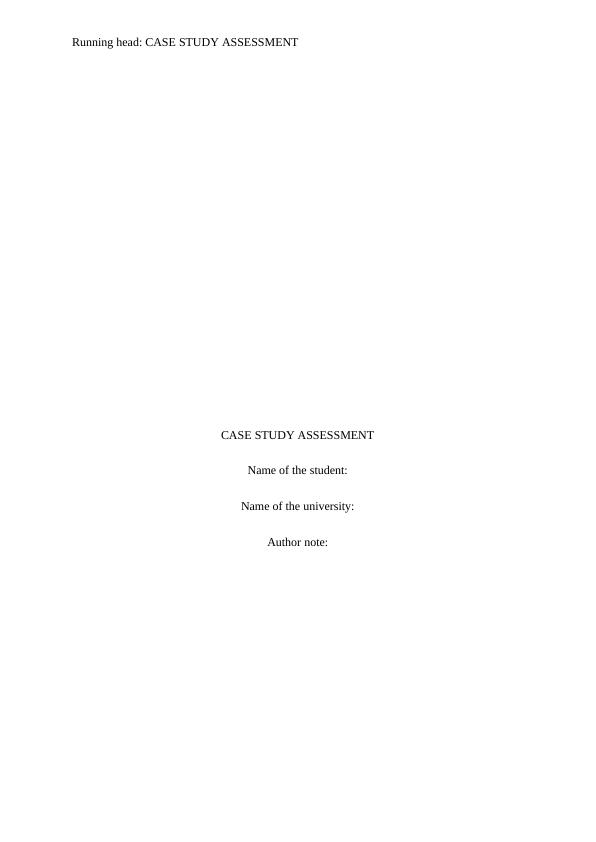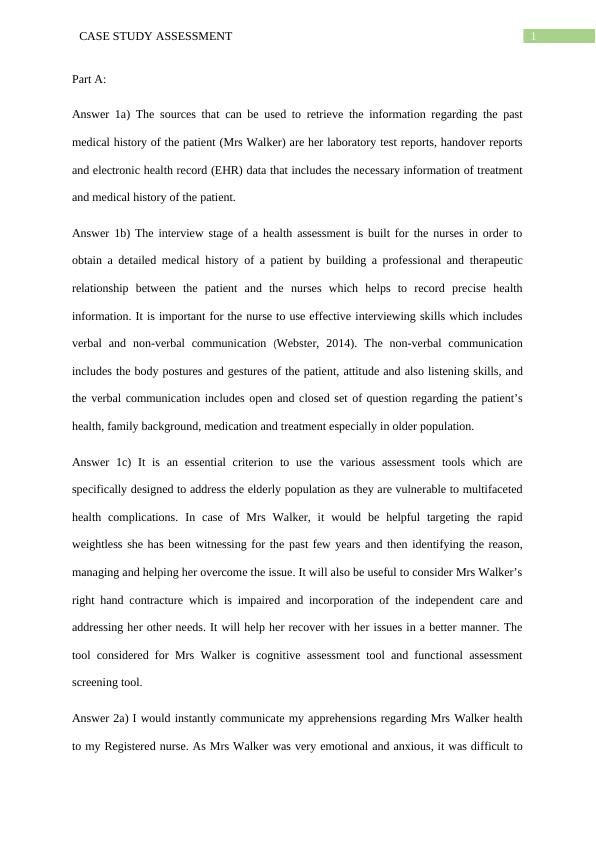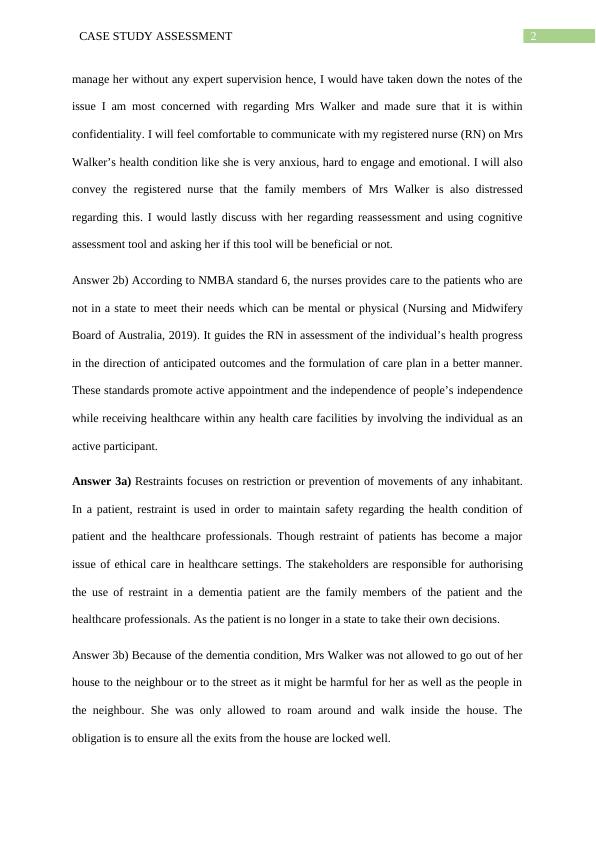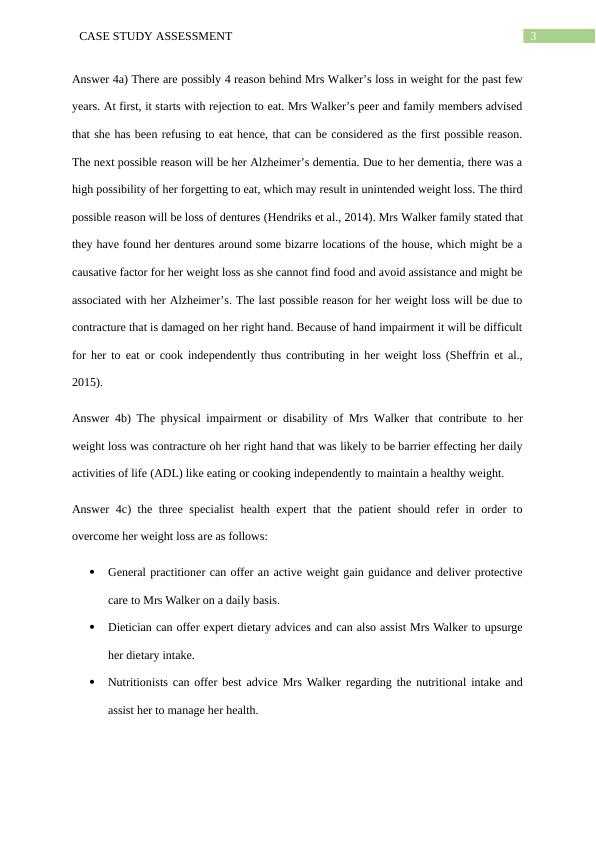Case Study Assessment
Added on 2023-01-17
13 Pages3771 Words2 Views
Running head: CASE STUDY ASSESSMENT
CASE STUDY ASSESSMENT
Name of the student:
Name of the university:
Author note:
CASE STUDY ASSESSMENT
Name of the student:
Name of the university:
Author note:

1CASE STUDY ASSESSMENT
Part A:
Answer 1a) The sources that can be used to retrieve the information regarding the past
medical history of the patient (Mrs Walker) are her laboratory test reports, handover reports
and electronic health record (EHR) data that includes the necessary information of treatment
and medical history of the patient.
Answer 1b) The interview stage of a health assessment is built for the nurses in order to
obtain a detailed medical history of a patient by building a professional and therapeutic
relationship between the patient and the nurses which helps to record precise health
information. It is important for the nurse to use effective interviewing skills which includes
verbal and non-verbal communication (Webster, 2014). The non-verbal communication
includes the body postures and gestures of the patient, attitude and also listening skills, and
the verbal communication includes open and closed set of question regarding the patient’s
health, family background, medication and treatment especially in older population.
Answer 1c) It is an essential criterion to use the various assessment tools which are
specifically designed to address the elderly population as they are vulnerable to multifaceted
health complications. In case of Mrs Walker, it would be helpful targeting the rapid
weightless she has been witnessing for the past few years and then identifying the reason,
managing and helping her overcome the issue. It will also be useful to consider Mrs Walker’s
right hand contracture which is impaired and incorporation of the independent care and
addressing her other needs. It will help her recover with her issues in a better manner. The
tool considered for Mrs Walker is cognitive assessment tool and functional assessment
screening tool.
Answer 2a) I would instantly communicate my apprehensions regarding Mrs Walker health
to my Registered nurse. As Mrs Walker was very emotional and anxious, it was difficult to
Part A:
Answer 1a) The sources that can be used to retrieve the information regarding the past
medical history of the patient (Mrs Walker) are her laboratory test reports, handover reports
and electronic health record (EHR) data that includes the necessary information of treatment
and medical history of the patient.
Answer 1b) The interview stage of a health assessment is built for the nurses in order to
obtain a detailed medical history of a patient by building a professional and therapeutic
relationship between the patient and the nurses which helps to record precise health
information. It is important for the nurse to use effective interviewing skills which includes
verbal and non-verbal communication (Webster, 2014). The non-verbal communication
includes the body postures and gestures of the patient, attitude and also listening skills, and
the verbal communication includes open and closed set of question regarding the patient’s
health, family background, medication and treatment especially in older population.
Answer 1c) It is an essential criterion to use the various assessment tools which are
specifically designed to address the elderly population as they are vulnerable to multifaceted
health complications. In case of Mrs Walker, it would be helpful targeting the rapid
weightless she has been witnessing for the past few years and then identifying the reason,
managing and helping her overcome the issue. It will also be useful to consider Mrs Walker’s
right hand contracture which is impaired and incorporation of the independent care and
addressing her other needs. It will help her recover with her issues in a better manner. The
tool considered for Mrs Walker is cognitive assessment tool and functional assessment
screening tool.
Answer 2a) I would instantly communicate my apprehensions regarding Mrs Walker health
to my Registered nurse. As Mrs Walker was very emotional and anxious, it was difficult to

2CASE STUDY ASSESSMENT
manage her without any expert supervision hence, I would have taken down the notes of the
issue I am most concerned with regarding Mrs Walker and made sure that it is within
confidentiality. I will feel comfortable to communicate with my registered nurse (RN) on Mrs
Walker’s health condition like she is very anxious, hard to engage and emotional. I will also
convey the registered nurse that the family members of Mrs Walker is also distressed
regarding this. I would lastly discuss with her regarding reassessment and using cognitive
assessment tool and asking her if this tool will be beneficial or not.
Answer 2b) According to NMBA standard 6, the nurses provides care to the patients who are
not in a state to meet their needs which can be mental or physical (Nursing and Midwifery
Board of Australia, 2019). It guides the RN in assessment of the individual’s health progress
in the direction of anticipated outcomes and the formulation of care plan in a better manner.
These standards promote active appointment and the independence of people’s independence
while receiving healthcare within any health care facilities by involving the individual as an
active participant.
Answer 3a) Restraints focuses on restriction or prevention of movements of any inhabitant.
In a patient, restraint is used in order to maintain safety regarding the health condition of
patient and the healthcare professionals. Though restraint of patients has become a major
issue of ethical care in healthcare settings. The stakeholders are responsible for authorising
the use of restraint in a dementia patient are the family members of the patient and the
healthcare professionals. As the patient is no longer in a state to take their own decisions.
Answer 3b) Because of the dementia condition, Mrs Walker was not allowed to go out of her
house to the neighbour or to the street as it might be harmful for her as well as the people in
the neighbour. She was only allowed to roam around and walk inside the house. The
obligation is to ensure all the exits from the house are locked well.
manage her without any expert supervision hence, I would have taken down the notes of the
issue I am most concerned with regarding Mrs Walker and made sure that it is within
confidentiality. I will feel comfortable to communicate with my registered nurse (RN) on Mrs
Walker’s health condition like she is very anxious, hard to engage and emotional. I will also
convey the registered nurse that the family members of Mrs Walker is also distressed
regarding this. I would lastly discuss with her regarding reassessment and using cognitive
assessment tool and asking her if this tool will be beneficial or not.
Answer 2b) According to NMBA standard 6, the nurses provides care to the patients who are
not in a state to meet their needs which can be mental or physical (Nursing and Midwifery
Board of Australia, 2019). It guides the RN in assessment of the individual’s health progress
in the direction of anticipated outcomes and the formulation of care plan in a better manner.
These standards promote active appointment and the independence of people’s independence
while receiving healthcare within any health care facilities by involving the individual as an
active participant.
Answer 3a) Restraints focuses on restriction or prevention of movements of any inhabitant.
In a patient, restraint is used in order to maintain safety regarding the health condition of
patient and the healthcare professionals. Though restraint of patients has become a major
issue of ethical care in healthcare settings. The stakeholders are responsible for authorising
the use of restraint in a dementia patient are the family members of the patient and the
healthcare professionals. As the patient is no longer in a state to take their own decisions.
Answer 3b) Because of the dementia condition, Mrs Walker was not allowed to go out of her
house to the neighbour or to the street as it might be harmful for her as well as the people in
the neighbour. She was only allowed to roam around and walk inside the house. The
obligation is to ensure all the exits from the house are locked well.

3CASE STUDY ASSESSMENT
Answer 4a) There are possibly 4 reason behind Mrs Walker’s loss in weight for the past few
years. At first, it starts with rejection to eat. Mrs Walker’s peer and family members advised
that she has been refusing to eat hence, that can be considered as the first possible reason.
The next possible reason will be her Alzheimer’s dementia. Due to her dementia, there was a
high possibility of her forgetting to eat, which may result in unintended weight loss. The third
possible reason will be loss of dentures (Hendriks et al., 2014). Mrs Walker family stated that
they have found her dentures around some bizarre locations of the house, which might be a
causative factor for her weight loss as she cannot find food and avoid assistance and might be
associated with her Alzheimer’s. The last possible reason for her weight loss will be due to
contracture that is damaged on her right hand. Because of hand impairment it will be difficult
for her to eat or cook independently thus contributing in her weight loss (Sheffrin et al.,
2015).
Answer 4b) The physical impairment or disability of Mrs Walker that contribute to her
weight loss was contracture oh her right hand that was likely to be barrier effecting her daily
activities of life (ADL) like eating or cooking independently to maintain a healthy weight.
Answer 4c) the three specialist health expert that the patient should refer in order to
overcome her weight loss are as follows:
General practitioner can offer an active weight gain guidance and deliver protective
care to Mrs Walker on a daily basis.
Dietician can offer expert dietary advices and can also assist Mrs Walker to upsurge
her dietary intake.
Nutritionists can offer best advice Mrs Walker regarding the nutritional intake and
assist her to manage her health.
Answer 4a) There are possibly 4 reason behind Mrs Walker’s loss in weight for the past few
years. At first, it starts with rejection to eat. Mrs Walker’s peer and family members advised
that she has been refusing to eat hence, that can be considered as the first possible reason.
The next possible reason will be her Alzheimer’s dementia. Due to her dementia, there was a
high possibility of her forgetting to eat, which may result in unintended weight loss. The third
possible reason will be loss of dentures (Hendriks et al., 2014). Mrs Walker family stated that
they have found her dentures around some bizarre locations of the house, which might be a
causative factor for her weight loss as she cannot find food and avoid assistance and might be
associated with her Alzheimer’s. The last possible reason for her weight loss will be due to
contracture that is damaged on her right hand. Because of hand impairment it will be difficult
for her to eat or cook independently thus contributing in her weight loss (Sheffrin et al.,
2015).
Answer 4b) The physical impairment or disability of Mrs Walker that contribute to her
weight loss was contracture oh her right hand that was likely to be barrier effecting her daily
activities of life (ADL) like eating or cooking independently to maintain a healthy weight.
Answer 4c) the three specialist health expert that the patient should refer in order to
overcome her weight loss are as follows:
General practitioner can offer an active weight gain guidance and deliver protective
care to Mrs Walker on a daily basis.
Dietician can offer expert dietary advices and can also assist Mrs Walker to upsurge
her dietary intake.
Nutritionists can offer best advice Mrs Walker regarding the nutritional intake and
assist her to manage her health.

End of preview
Want to access all the pages? Upload your documents or become a member.
Related Documents
The Health Assessment Processlg...
|12
|3104
|100
HealthCare : Multidisciplinary Team Case Studylg...
|9
|2952
|32
Case Study Analysislg...
|8
|1741
|27
Partnerships in Chronicitylg...
|7
|1387
|424
Short Case Studies on Nursing Ethics and Pain Managementlg...
|5
|1337
|329
Clinical Leadership and Managementlg...
|10
|2919
|37